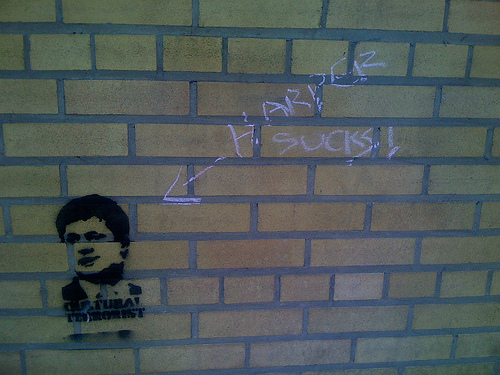The clash of cultures has come to Canada. Some might call it a clash of civilizations. I don’t mean the non-existent conflict not between the entire Muslim world and the “civilized’ world, which Muslim-baiting demagogues have invented. The real battle everywhere is between extremists of all kinds and more levelheaded people.
Canada is no longer a united country. An unbridgeable gap has grown between what we can broadly label conservatives and liberals. In the United States, reactionaries like Pat Buchanan for years insisted that the country was engaged in a ferocious internal culture war, and today no one doubts it. The Tea Party, the Koch brothers, the National Rifle Association, anti-choice absolutists and many others consider themselves to be at war, however metaphoric, with all who disagree with them.
Canadians have long believed we were immune from such destructive divisions. For 145 years we’ve been proud to think of ourselves as one people, that whatever our disagreements they were trumped by our collective sense of Canadian-ness and the values we shared. By and large, from John A. on, while we criticized our governments, we rarely considered them treasonous.
Of course there have been exceptions aplenty to this enlightened form of democracy — the FLQ, Trudeau-loathing Albertans, as well as haters of Muslims, blacks, immigrants, Catholics, Jews and other bigots who have sullied our history, to name only some.
How do Stephen Harper and his Conservatives fit into this profound schism over our basic values? Many Canadians believe the Harper government has shattered the historic mould. Harperland is a place many Canadians do not recognize as theirs. Mr. Harper seems not to share many traditional Canadian cultural values and a good number of Canadians feel estranged from his government.
Still, not everyone agrees that the Harperites have gone so far as to radically break with the Canadians consensus. So let me offer two other examples that seem to me more definitive: our wildly conflicting attitudes towards Omar Khadr and Toronto Mayor Rob Ford. Each has his passionate supporters and equally passionate detractors, and each stands for something much larger than himself. And never, it seems clear, will the twain meet.
What’s fascinating about the Khadr case is how many separate aspects there are, and how sympathizers and foes disagree about every single one of them. Here’s a fast rundown: Should we be sympathetic that he was brainwashed from childhood by a fanatical father? Should we care than he was a child soldier? Should any soldier be tried for killing another soldier in combat? Did he kill U.S. Sgt. 1 st Class Christopher Speer?
Is it relevant that this 15-year old was terribly wounded in that same battle? Or that he was both physically and psychologically tortured since? That he’s been locked up, away from the world, for 10 years? That his government betrayed him and denied him his rights? That the one psychiatrist most hostile to him harbours strong anti-Muslim views? That many more experts of various kinds have found Khadr to be a sympathetic human being?
I suppose the wording of my questions give me away. Yes, on every count, I find the evidence largely to favour Khadr. But I also know that Canada’s Minister of Public Safety, Vic Toews, as well as a swarm of Sun Media sages, consider him a menace and a traitor, guilty on all counts. This is more than a disagreement. This reflects completely different worldviews that simply cannot be reconciled.
Now take Rob Ford — please. In the beginning, many Torontonians were sure it was impossible that this unprepossessing man could ever be elected their mayor. When he won in a landslide, the spotlight has focused on his cornucopia of bizarre antics, failures and self-inflicted scandals. Many feel humiliated that this man is seen as the reflection of Toronto. Yet his re-election is by no means impossible. The latest poll shows that even now a mind-boggling 77 per cent of his 2010 voters are still satisfied with the job he’s doing. He remains to them a populist hero, a perception completely unfathomable to opponents. There is no conceivable bridge between these two groups of Torontonians.
As with Omar Khadr, there’s something larger going on here. There’s an irreconcilable clash of cultures. There are two diametrically opposite ways of seeing the world constituting a profound conflict of values. So not only do the two sides disparage each other, they can’t begin to understand each other.
It’s a good bet that Rob Ford enthusiasts and Omar Khadr antagonists are mostly the same people and that both are part of Stephen Harper’s original and most reliable base. This 30 per cent — although not necessarily the support he has received beyond them, especially in the last election — disproportionately opposes abortion, gay marriage and gun control and denies global warming and evolution. Many, paradoxically, belong to the 99 per cent. As in the U.S. and Europe, culture often trumps class. They resent more successful peers rather than the 1 per cent.
These are the new conservatives, threatened by a world where the only certainty is constant dizzying change. They find less and less in common with other Canadians who in turn find them baffling, strangers in a strange land. The two groups can barely connect with each other. This is not the Canada we once knew and no one knows how to deal with it.
Photo: Neal Jennings/Flickr
This article was first published in the Globe and Mail.




